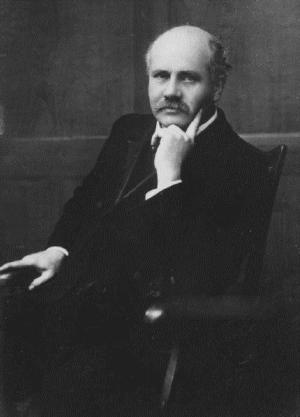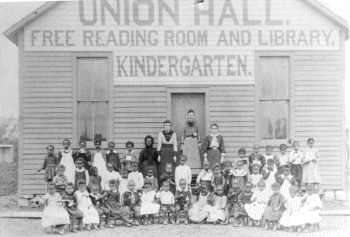 SKC Films Library SKC Films Library |
| SKC Films Library >> Religion and Mythology >> Christian Denominations >> Congregationalism |
| Charles Monroe Sheldon creator of "What Would Jesus Do?"
Charles Monroe Sheldon was born in Wellsville, New York, on February 26, 1857. His father, a Congregational minister, moved the family five times before finally settling on a homestead in what is now South Dakota. Charles attended Phillips Academy in Andover, Massachusetts, graduated from Brown University 1883, and from Andover Theological Seminary in 1886. Sheldon believed that the Bible compelled Christians to be social reformers, but he found the congregation of the Congregational Church in Waterbury, Vermont, (which had hired him in 1886) non-receptive to his ideas. In 1889, he was asked to minister at the newly organized Central Congregational Church in Topeka, Kansas, and he jumped at the opportunity. He married Mary Abby Merriam on May 20, 1891; the couple had one child. Almost immediately after arriving in Topeka, Sheldon became known for his very unorthodox methods. Wanting to personally understand how it felt to be unemployed, Sheldon donned an old suit and applied for work at almost every store in town, and was turned down by every single one of them. He also spent a great deal of time visiting settlement houses and institutional churches, and publicly endorsed Ralph Albertson's social gospel commune, the Christian Commonwealth Colony in Georgia. When he became aware of a large group of impoverished former slaves living in Topeka, he convinced white Topekans to undertake relief projects to help them. In 1893, he and his church sponsored the first African-American kindergarten west of the Mississippi. His church was also one of the first Protestant congregations in the country to openly accept blacks. Sheldon was well loved by his Sunday morning congregation, but he was somewhat dismayed by the lack of attendance at his Sunday evening services. To increase attendance, he began telling stories that ended with a "cliff hanger" that required listeners to return the following week if they wanted to find out how they ended. The unique idea worked, and soon his evening services were as well attended as his day services. In fact, Sheldon's stories became so popular that a Chicago religious magazine began publishing them in 1896. In His Steps, a book collection of his stories, was published in 1897, and was the second-largest selling book after the Bible for 60 years. Sheldon was a firm believer in conducting one's life according to the principle "What Would Jesus Do?" According to Sheldon, every situation in which someone found himself could be handled easily by simply acting as Jesus would, even if doing so meant lowering one's social standing or popularity. In 1900, the publisher of the Topeka Daily Capitol gave Sheldon the opportunity to take over the paper for a week and operate it according to his "What Would Jesus Do?" guidelines. Sheldon's affect on the paper was immediate. Instead of stories about boxing matches and violent crimes, he ran pieces on social reform, the progress of Christian missions, and crises needing attention. He also made changes in the paper's advertising, refusing to run ads for tobacco, liquor, and other products he disapproved of, and changing other ads to remove any hints of false claims. His experiment worked, as the paper's circulation went from 15,000 daily copies to over 350,000 internationally for that week. Sheldon retired from the church in 1920 and became editor of the Christian Herald. Although he stepped down from the pulpit, he never backed away from his causes. He was an advocate for woman's suffrage, equal rights for all regardless of race, religion, or sex, prison reform, the upgrading of police departments, and promotion of moral entertainment. His most passionate cause, however, was prohibition, and he was very active in getting the Eighteenth Amendment ratified; he remained an advoate for Prohibition even after its repeal in 1933. In keeping with his "What Would Jesus Do?" philosophy, he was a vocal proponent of pacifism during World War II despite that position being very unpopular. Charles Monroe Sheldon died in Topeka on February 24, 1946. SEE ALSO |
| SKC Films Library >> Religion
and Mythology >> Christian
Denominations >> Congregationalism This page was last updated on June 07, 2017. |

